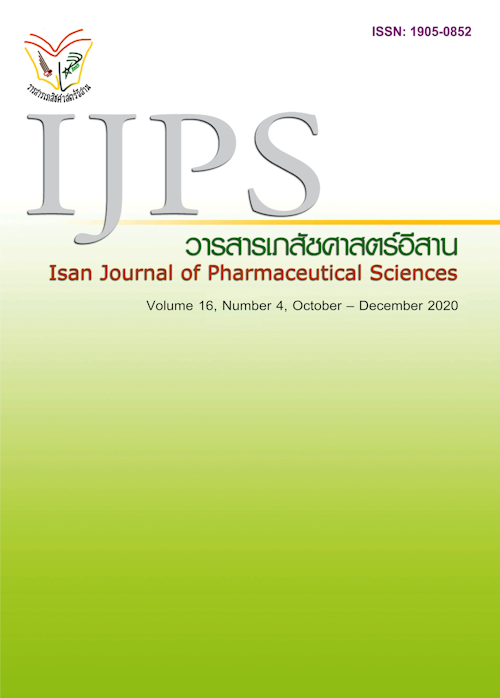Long-Term Effect of Beta-Blockers on Mortality in Patients with Acute Myocardial Infarction Without Reduced Ejection Fraction in Phitsanulok
Main Article Content
Abstract
Currently, the American College of Cardiology/American Heart Association (ACC/AHA) and The European Society of Cardiology (ESC) guidelines remain unclear about the benefits of beta-blockers to reduce mortality among acute myocardial infarction (AMI) patients without reduced left ventricular ejection fraction (LVEF > 40%). Previous studies showed inconsistent results regarding the duration of benefits of using beta-blockers in AMI patients without reduced ejection fraction with LVEF > 40% to reduce major adverse cardiovascular events and mortality. Objective: This study aimed to assess the long-term effects of beta-blockers on mortality and major adverse cardiac events (MACE) in patients diagnosed with acute myocardial infarction without reduced left ventricular ejection fraction (LVEF > 40%). Method: This was a retrospective cohort study. Inclusion criteria were patients who had been firstly diagnosed with AMI and had LVEF > 40%, then they were divided into two groups including those prescribed beta-blockers at the time of discharge from hospital and those who were not. These two groups were followed up for 2 years. Data were obtained from the electronic medical record from Buddhachinaraj Hospital and Naresuan University Hospital. Cox proportional hazards model were used to estimate the effects of the primary outcome including death from any cause and MACE within 2 years after discharge. Results: A total of 473 patients with AMI and having LVEF > 40% were firstly diagnosed, 337 patients were prescribed with beta-blockers, 136 patients were not. It was shown that patients without beta-blockers had a higher rate of all-cause of death and MACE (8.8 percent) as compared to those with beta-blockers (7.4 percent). There were no statistically significant differences in all-cause death and MACE between the two groups observed (adjusted HR 0.62, 95%CI 0.31 to 1.24; p=0.172). Conclusion: Acute myocardial infarction patients without reduced left ventricular ejection fraction (LVEF > 40%) using beta-blockers and not using beta-blockers showed no significant differences in reducing all-cause of death and major adverse cardiac event.
Article Details
In the case that some parts are used by others The author must Confirm that obtaining permission to use some of the original authors. And must attach evidence That the permission has been included
References
Amsterdam EA, Wenger NK, Brindis RG, et al. 2014 AHA/ACC Guideline for the management of patients with non ST-elevation acute coronary syndromes: a report of the American College of Cardiology/American Heart Association task force on clinical practice guidelines. J Am Coll Cardiol 2014; 64: e139-228.
Bureau of policy and strategy. The Ministry of Public Health. Causes of deaths. Public Health statistics [Online]. 2018 [cited 2020 Feb 15]:76-7. Available form: http://bps.moph.go.th/new_bps/sites/default/files/statistic%2061.pdf
Choo EH, Chang K, Ahn Y, et al. Benefit of beta-blocker treatment for patients with acute myocardial infarction and preserved systolic function after percutaneous coronary intervention. Heart 2014; 100: 492-499.
Dondo TB, Hall M, West RM, et al. Beta-blockers and mortality after acute myocardial infarction in patients without heart failure or ventricular dysfunction. J Am Coll Cardiol 2017; 69(22): 2710-2720.
Ibanez B, James S, Agewall S, et al. 2017 ESC Guidelines for the management of acute myocardial infarction in patients presenting with ST-segment elevation. Eur Heart J 2017; 00: 1-66.
Konishi H, Miyauchi K, Kasai T, et al. Long-term effect of beta-blocker in ST-segment elevation myocardial infarction in patients with preserved left ventricular systolic function: a propensity analysis. Heart Vessels 2016; 31: 441-448.
O’Gara PT, Kushner FG, Ascheim DD, et al. 2013 ACCF/AHA Guideline for the management of ST-elevation myocardial infarction: a report of the American College of Cardiology/American Heart Association task force on clinical practice guidelines. J Am Coll Cardiol 2013; 61: e78-140.
Ozasa N, Kimura T, Morimoto T, et al. Lack of effect of oral beta-blocker therapy at discharge on long-term clinical outcome of ST-segment elevation acute myocardial infarction after primary percutaneous coronary intervention. Am J Cardiol 2010; 106(9): 1225-1233.
Puymirat E, Riant E, Aissoui N, et al. Beta-blockers and mortality after myocardial infarction in patients without heart failure: multicentre prospective cohort study. BMJ 2016; 354: i4801.
Roffi M, Patrono C, Collet JP, et al. 2015 ESC Guidelines for the management of acute coronary syndrome in patients presenting without persistent ST-segment elevation. Eur Heart J 2016; 37: 267-315.
Smith SC, Benjamin EJ, Bonow RO, et al. AHA/ACCF Secondary prevention and risk reduction therapy for patient with coronary and other atherosclerotic vascular disease: 2011 update: a guideline from the American Heart Association and American College of Cardiology foundation. Circulation 2011; 124: 2458-2473.
World Health Organization [Internet]. Geneva; c2017.Prevention of Recurrences of Myocardial Infarction and Stroke Study; [cited 2017 Sep 1]; [about 1 p.]. Available from: http://www.who.int/cardiovascular_diseases/priorities/secondary_prevention/country/en/index2.html.


